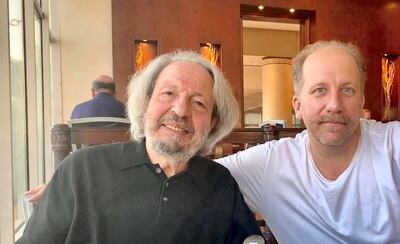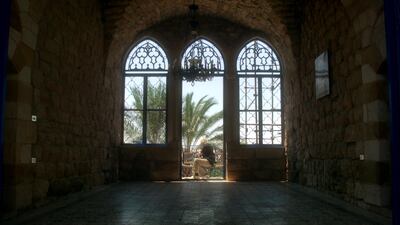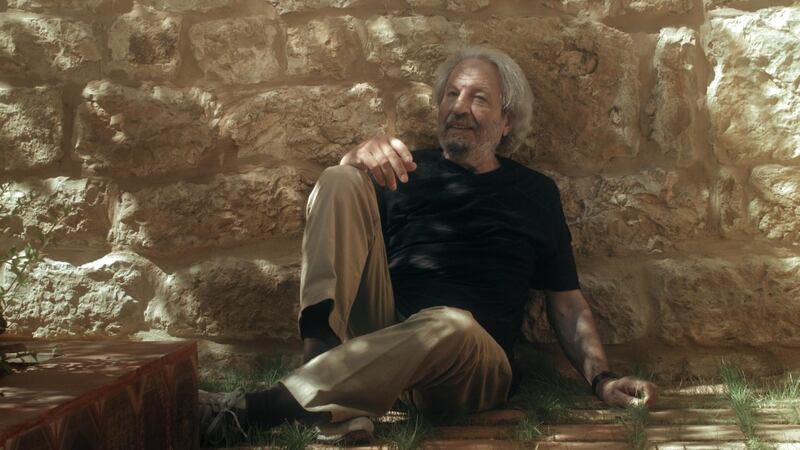Syrian director Mohamed Malas is not a household name, at least outside the student circle of Arab cinema. However, Abu Dhabi filmmaker and academic Nezar Andary is hoping to bring the acclaimed Syrian auteur's work to a wider audience, when his documentary Unlocking Doors of Cinema made its international premiere online during the San Francisco DocFest on Thursday.
The film will be screened all of this week, as part of a package that also includes Khawla Al Hammouri and Louis Sayad DeCaprio's short documentary A Syrian Woman, which follows the lives of six Syrian refugee women in Jordan. A live Q&A session with Andary is also scheduled to take place on Saturday, September 19.
Andary is an associate professor at Zayed University, where he teaches film, literature and philosophy. He has produced a number of short documentaries, frequently in collaboration with Abu Dhabi’s Arab Film Studio, prior to this feature debut. He first discovered Malas’s work as an undergraduate in the US, and would later go on to study under the master in Syria.
Unlocking Doors of Cinema features intimate interviews with the veteran filmmaker, 75, as well as archive footage of some of his best-known films.
Malas is widely hailed as the Arab world's first auteur filmmaker, and his work regularly features in lists of the greatest Arab films. His Dreams of the City (1984) featured at No 6 in the Dubai International Film Festival's 2013 book Cinema of Passion, which polled about 500 critics, writers and academics to compile a list of the 100 greatest Arab movies.
In the same year, Malas's 1992 title The Night, also made The Guardian's list of the 10 best Arab films.
Andary’s affection for his subject is clear, not only through the reverence with which he discusses Malas, but also in almost every scene as his film unfolds.

The cinematic language that Andary speaks in the documentary frequently seems to be offering a postmodern acknowledgement of the film's subject. Rather than sitting on a chair answering questions during interviews, Malas is often framed in portrait amid the impressive surrounds of a Lebanese castle.
So is Andary intentionally mimicking the highly visual cinema of his muse? “In a documentary, you want to let someone be themselves,” he explains. “The effort in the shots and in some of the compositions, yes – it’s always connected to one of his films.”
Andary cites one particular scene that finds Malas in a room almost identical with the key location from the auteur's first feature, Dreams of the City, and says this ploy led to the director becoming extremely emotional.
He says he did not restrict himself to referencing just Malas's work. "It's an homage and then it's also a game," says Andary. "There is a time when he talks, and he disappears. I'm trying to do a silent cinema technique that harks back to Georges Melies [director of 1902's A Trip to the Moon]. Most people are not going to know that, but it's fun for me."
If Malas failed to achieve the same global recognition as some of his contemporaries during his five-decade career, it could be because of the wilfully oppositional nature of his work.
Malas studied filmmaking in Moscow in the 1960s, where he later shared a room with leftist Egyptian novelist Sonallah Ibrahim. Ever since then his films have reflected the revolutionary fervour that coloured that time, location and his roommate. His graduation film, which starred Ibrahim, discussed propaganda during the 1967 Arab-Israeli conflict from the perspective of Arab prisoners. Prisons and freedom of speech feature frequently in his work.
The Palestinian struggle would also become an enduring theme, perhaps unsurprisingly for a native of Quneitra, a town that was historically a stopping-off point for fighters on their way to the region, and that was all but destroyed during the occupation of the Golan Heights.

Malas has also dealt with the struggles of the Syrian people, and the schism between the country’s secular and conservative elements, which endures to this day. In doing so he ensured that not only were many of his films unpalatable to postcolonial, Cold War-era western audiences, but his work was frequently banned in Syria, too.
Andary seems to be bringing some of this outsider aesthetic to his own film. Fiercely independent, with a small academic grant from his university being the only outside funding he received, Andary's film serves as a companion to a book series on Arab cinema, which he is co-editing for academic publishing company Palgrave Macmillan.
Rather than the usual roster of academics, however, Andary is enlisting directors, producers and journalists to write the books.
“My co-editor Samirah and I really wanted to change the way people were writing on Arab cinema, so it was no longer just ethnographic, and no longer a history of ‘this director did this and this director did that,” he explains.
“I’m really pushing the book series to be a way of writing on Arab cinema from different angles that have not been touched by academics before, instead of just being us, the critics, saying ‘this is what his film’s about, and here’s a theory from Roland Barthes’.”
Andary also hopes his film will stand apart from many recent documentaries covering Syrian and Palestinian topics, specifically by eschewing their focus on suffering: “Some people may have wanted the film to be more political, and me to push him more on the crisis,” he concedes.
“But I really tried to show Malas as a hero. He is not a victim, and he is not someone to feel sorry for. His life, and his work, offer a testament to the heroism of persistence and expression, and that is what I wanted to show.”
‘Unlocking Doors of Cinema’ is available online as part of San Francisco DocFest, which runs until September 20. More information is available at sfdocfest2020.eventive.org






